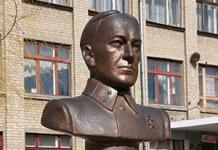This collection really contains information about people who are simply haunted by failure. True, some of them can be called, at the same time, lucky ones, since they survived in these difficult situations.
Probably the truth is they say that there are lucky people who are lucky and who can get out of the water. And there are losers who do not even understand why they are being punished. Do you think this division into "lucky" and "losers" is fair?
Japanese survivor of Hiroshima and Nagasaki

This man, Tsutomu Yamaguchi, was born and lived in Nagasaki. On August 6, 1945, he was in Hiroshima on a business trip. On this day, he was already going to leave the city, but on the way to the station he remembered that he had forgotten the documents necessary for registration of travel (do not forget, it is military time).
I had to return, but it was at this time that the American military dropped the "Kid" atomic bomb on Japan. The epicenter of the explosion was just 3 kilometers from the Tsutomu Yamaguchi Hotel.
The explosion severely damaged the health of the Japanese. He was temporarily blind, deaf, plus he received burns on the left side of his body. The doctors were able to help him, and after a while he went to Nagasaki.
Well, on August 9, the bomb was dropped on this settlement. Again, "Fat Man" fell three kilometers from Tsutomu's work. True, this time he was not injured - he was lucky.
In 2009, the Japanese authorities officially recognized Tsutoma as the only person who survived both bombings. True, a year later Tsutomu died of stomach cancer, at the age of 93.
The only resident of the city who did not win the lottery
In 2012, residents of the small Spanish town of Sodeto bought lottery tickets. Then a nationwide draw was held, and the amount of the prize was huge, about 950 million US dollars.
As you can imagine, all the residents of the town turned out to be lottery winners, and everyone received some part of the prize. It is worth noting that there are only 70 families in this town, so one shouldn't be surprised.
Only the only resident of the city who could not / did not want to purchase a lottery ticket did not win. He probably still regrets it.
Cruise ship stewardess, Titanic survivor, Britannica, Olympic

In 1911, a 23-year-old girl, Violetta Jessop, took a job as a flight attendant on the Olympic, a cruise ship that is almost a complete replica of the Titanic. Olympic collided with another ship that year. It was not the worst crash, and the flight attendants managed to escape.
A year later, Violetta worked on the Titanic, also as a flight attendant. As we all know, the Titanic collided with an iceberg and sank. She was able to escape in a lifeboat with 16 other passengers and was taken aboard the Carpathia.
Finally, during World War II, Violetta worked as a flight attendant on the Britannica ship. This ship hit a mine and sank very quickly. However, Violetta managed to escape again on a lifeboat.
The woman lived for quite a long time, and died a natural death in 1971.
The unluckiest Englishman

This is how the British media call John Calamity, an Englishman who constantly finds himself in difficult situations.
He has survived car collisions, lightning strikes, car accidents and much more. There were 16 such situations that were dangerous to his life. All these cases undermined John's health, but he is alive and well. However, he really can be called the most unlucky Briton.
"Wonderful" vacation in the Bahamas

Eric Norrie, one unlucky day for him, decided to go on vacation to the Bahamas. There he was overtaken by a shark while swimming. The shark bit off a large chunk of his caviar, but was driven away by Eric's stepfather.
Not having time to recover, Eric found himself in a new difficult situation - he was struck by lightning. Well, after (or during) the hospital he was bitten by a poisonous snake.
Probably, this kind of rest is worse than any hard work. Although Eric is not discouraged, and continues to be cheerful.
In chapter
Russian citizens have two strong convictions. First, they are the most unhappy. Second, they do not have enough money to be happy. An American sociologist has proven that the first statement is true, but the second is not. True, there is some good news. Our grief can be helped if there is a desire.
For 30 years, under the leadership of the University of Michigan professor Ronald Inglehart, the World Values Survey (WVS) was conducted. Within its framework, scientists study civil society in hundreds of countries around the world. People are asked how happy they are, and the sociocultural values they hold are also explored. Every year, the WVS publishes the "Happiness Index", which is very popular in the world media. Russia traditionally ranks last in this index. Our citizens feel as miserable as the people of impoverished Nigeria and war-ravaged Iraq.
The most unfortunate people on Earth live in Russia. This is already a scientifically established fact.“Russia is a unique case. Here the level of happiness is much lower than it should be under the current state of affairs, ”says Ronald Inglehart. According to him, incredible pessimism was revealed back in the days of the USSR: in 1981, his group conducted a pilot study in the Tambov region. The results were shocking.
“The level of happiness depends on the level of income - in rich countries there are more happy people. But in the Tambov region the level of unhappiness was recorded at the level of India and Nigeria, which were much poorer, ”says Inglehart.
Since 1991, in Russia, the level of happiness has been measured every five years. The results impressed the scientist so much that from next year he will head the Laboratory for Comparative Social Research, which is opening here on a grant from the Russian government.
“Your country is a very interesting case,” the scientist admits. “Although, of course, I would not wish anyone to be the object of such interest - after all, this is the same as the interest of a doctor in a unique disease.”
The "social doctor" Inglehart knows what he is saying: judging by the results of measurements, Russia has fallen from a low level of happiness in 1991 to a completely impossible level. Moreover, such a speed and depth of the fall has never been recorded - even in countries affected by war, epidemics and famine.
But this was not enough - by 1996, the level of happiness fell even more. And more ... A slight increase was recorded only in 2006. By this time, the country was bathed in petrodollars, holidays in foreign resorts became commonplace for Russians, and Russian prices were a shock to stingy foreigners. At the same time, the Russian citizens had as much happiness as the Albanians.
Inglehart explains the Russian phenomenon by the stagnation and then the collapse of the USSR, the lack of democracy, etc., but generally acknowledges that the answer is not complete. Still, the collapse of communism has affected other countries, and even the former Soviet republics, many countries have experienced much more misery and poverty, and there is no such pessimism among their citizens. In essence, Inglehart came to our country to search for the reasons for the phenomenal unhappiness of Russians.
One of the explanations is the sociocultural values of Russians. In 2006, WVS made a kind of cultural map of the world. All studied countries (and this is 90% of the world's population) were distributed along two coordinate axes. One concerns cultural values: traditional versus modern. Roughly speaking - "All for one" or "Everyone for himself." The second measures motivation: the values of survival - the values of self-realization. Again, continuing the generalization: "Better to live on your knees" or "Better to die while standing."
The results are as follows. The Scandinavians felt that it was better to die while standing, but every man for himself. The English-speaking world also chose to die standing, but about everyone doubted for himself. The Japanese and the inhabitants of Southeast Asia, professing Confucianism, decided that everyone, of course, is for himself, but that it is not necessary to die while standing. The inhabitants of Catholic Europe disagreed with the Confucians on only one point: they are not sure that everyone is for himself. The proud inhabitants of Latin America, naturally, answered that they were ready to die standing, but all for one. Residents of Africa and South Asians are ready to live on their knees, but again all for one. In post-Soviet countries, citizens preferred to live on their knees, but every man for himself.
Russia here turned out to be the most "advanced" - even the inhabitants of Africa are not ready to endure like the Russians, and comparable individualism was found only among the Bulgarians and Belarusians. It is clear that in a world where “everyone dies alone” and “you die today, and I will die tomorrow”, it is difficult to be happy.
The second explanation lies in the discovery made by Ronald Inglehart's group. It turned out that the saying “happiness is not in money” is absolutely true. True, only from a certain level of income: when the country's GDP per capita exceeds $ 5,000 a year. Up to this point, improving the well-being of citizens makes them happier. Moreover, with a GDP below 2 thousand dollars a year, this is the only thing that can bring them happiness. If the level of GDP exceeds 15 thousand dollars per capita, then money cannot make citizens happy. “Bill Gates is hardly much happier than the average American,” Inglehart explains.
Russia belongs to the countries where GDP per capita is about 15 thousand dollars. Therefore, we do not become happier when the price of oil rises. “Greater wealth helps people to be happy only in poor countries,” Inglehart explains. - If we were talking about countries such as Nigeria or India, I would advise their governments to raise their economies. But already from the countries of the level of Portugal with the increase in income, happiness grows slowly or does not grow at all. "
So, Russia is much more than an increase in wages and even pensions will be helped by greater equity in the distribution of income. “The greater the inequality in a country, the more miserable the people are,” says Inglehart. He also notes the need for democracy. But not so much in politics, but rather in everyday life. “A person who has freedom of choice is confident that he can change his life for the better, and this makes him happier,” says the scientist. And freedom of choice is not only and even not so much the election of government bodies as the opportunity to choose a place of residence, education, work, medical care, and so on. That is, we need transport accessibility for all regions, a reform of education and medicine, a reform of the registration system and many other reforms.
Finally, there is another factor that generally has little dependence on the authorities, but which is a good indicator of the level of happiness: tolerance. “Societies that are tolerant of people of other races, nationalities, religions, gender preferences, and so on are happier,” says Inglehart. "And the best indicator of the level of happiness is the attitude towards a woman." This sign was noticed by the American writer Robert Heinlein even before the scientist. The health of a society can be judged by its attitude towards women, the hero of his most famous novel, Friday, teaches. A society that humiliates women is painful.
However, one cannot but take into account the peculiarity of Russian citizens, which the economist Yevgeny Yasin calls "a high level of poverty." This phenomenon, one might say, is historical and is reflected in the same saying about the Kazan orphan, which, as is known from Russian history, received rich gifts from Ivan the Terrible for complaints. “It is already written in our brains: bend down, do not stick out, this is still coming from the Tatar-Mongol yoke,” says psychologist Valery Gostev. It is still profitable to be poor in Russia - here Russian citizens give answers that amaze honest American scientists. However, this benefit is questionable.
First, it makes it difficult to see the real problems. The writer Varlam Shalamov in his famous "Kolyma stories" wrote how prisoners, in order to go to the "hospital", feigned illness, not noticing that they were already terminally ill. We are not crying about what sociologists say. Russian society is "atomized", all social and even family ties are being broken, and people complain that they do not have enough money, or even that their neighbor has more money.
Secondly, it is not for nothing that the same American psychologists believe that in order to become happy, one must first smile. "Pose of the mourner" sooner or later leads to the fact that a person really begins to believe in his misfortunes.
Result? Already in the first study in the Tambov region in 1981, Inglehart found an increase in alcoholism and an increase in male mortality - what is now recognized as a weapon of murder of the nation. Note that we are talking about 1981, not 1991. That is, the "damned democrats" have nothing to do with it. At first, we thickened the colors a little so that there was something to drink for. Then they believed themselves and added. Then reality confirmed that we were right (and how could it be otherwise, because no one doubted the worst) - well, how can we not get drunk. Then ... And then it may be too late: the heart of society, like the heart of a person, can not stand it, warns the scientist. Pessimism kills.
Perhaps it was the authorities' awareness of this danger that caused Inglehart's group to be the only one in the social sciences to win a grant from the Russian government. The scientist himself admits that he is ready to give advice on the results of the research. “I don’t want a country with so many nuclear weapons to be cornered and filled with unhappy people,” he simply explains his interest in the project. Our interest is much higher, so it is worth listening carefully to the advice of a scientist. And to begin with, try to at least learn to smile.
If you think you are having a bad day, just read this article about the most unlucky people in the world and it will immediately feel better for you. Failures of most of these people are so rare that they could match the likelihood of a vulture throwing a turtle on your head… twice.
9. The whole village won the lottery, except for one person
Every Christmas in Spain there is a lottery with a huge win, it is even called "El Gordo", which means "big jackpot".
And the small village of Sodeto had a huge reason to celebrate, as all but one of 70 families bought lottery tickets. And these lucky numbers of local residents (58268) won the main prize of $ 950 million - respectively, each family got a part of the amount. Just think! It turned out that residents, mostly farmers and unemployed construction workers, ended up with millions in their hands.
All but one unlucky guy - Costis Mitsotakis. Poor Kostis. The Good Samaritans from the Housewives' Association who distributed the tickets decided not to knock on his door.
8. Lightning Rod Man
They say lightning never strikes the same place twice - but it struck Roy Sullivan as many as seven times. Yes, yes, you heard right - seven times. Roy was a ranger at the Shenandoah National Park in Virginia. He is listed in the Guinness Book of Records for being the most struck by lightning.
Think about this for a moment - the odds of being struck by lightning at least once in your life are roughly 3000 to 1. The chance of being struck by lightning seven times is twenty-two septillion to one. That's 22,000,000,000,000,000,000,000,000 to 1!
It can be assumed that after the sixth time an ordinary person would stay at home ... or buy lottery tickets - but not Roy! The last time he was struck by lightning was rumored to be the most impressive.
After lightning struck Roy while he was fishing, the bear decided to add unpleasant impressions to an already serious injury - he decided to steal trout from his fishing line. Seeing this, Sullivan gathered his will into a fist and hit the bear with a branch to take his fish back. Tough guy, to be sure.
7. Bullet ghost
If we talk about unhappy people, it will be difficult to find someone more unhappy than Henry Zeigland - a person who thought he had managed to cheat fate. Surely what happened to him was a kind of poetic justice.
It all began in 1883, when he broke off relations with a girl who later killed herself in despair. Maddened, her brother swore an oath that he would kill Siegland at all costs. He tracked him down and shot him. Finding Siegland dead, he pointed the gun at himself and took his own life.
However, Siegland never thought of dying. The bullet only scratched his face and plunged into the huge tree behind him. At that time, he considered himself an incredibly happy person.
However, the story did not end there. Many years later, Siegland decided to cut down the tree into which the ill-fated bullet crashed. The task was not an easy one, therefore, to make his job easier, he decided to blow up the tree with the help of several plates of dynamite.
From the explosion, the bullet flew off and hit Siegland directly in the head, killing him on the spot. Just horror - or incredible bad luck.
6. The hairiest man in the world
Dear ladies, if you are complaining that your man is too hairy, we suggest you take a look at Yu Zhen Huang, officially the hairiest man in the world.
As a result of a rare disease, 96% of Yu's body is covered with hair. Moreover, Yu had to undergo surgery in order to remove the hair from his ears, as it affected his hearing.
Black fibrous down covers every inch of his lanky body, except for the palms and soles of his feet. On average, there are 41 hairs per 1 square centimeter of his body skin. He suffers from atavism, and he was clearly not lucky with his appearance.
Yu decided to use his unique appearance. He posted his photos on two sites: www.maohai.com and appropriately named www.hairboy.com. He hopes to get a contract and become a new Chinese rock star.
Now he is looking for a wife. Let's see what comes of it.
5. The most unhappy woman in America
After losing four homes to four hurricanes, Melanie Martinez could rightfully be the unluckiest woman in America. In 1965, there was Betsy, in 1985, Juan, in 1998, George, and in 2005, Katrina. Such was the price of living on a floodplain in Louisiana.
But then the school bus driver was lucky. The reality show chose to transform her dilapidated home in Braithwaite, south of New Orleans. The team spent a full week and $ 20,000 transforming the Martinez home. She has a new kitchen, new wardrobes and new appliances - including a 50-inch TV. “They did a great job. I really liked it, ”says Martinez.
But on Wednesday, August 29, seven years after Katrina, Hurricane Isaac of the first category, emerging from the sea abyss, again destroyed her house.
Martinez, her family members, as well as 5 kittens and three dogs were rescued by boat. They have lost everything. “Now I have lost five houses to five hurricanes. Every time my house is flattened. "
Melanie, maybe we should consider building a house on a hill next time?
4. The unluckiest man in the UK
"Disaster" John Lyne is often referred to as Britain's most unlucky man, having survived 16 major accidents in his life, including a lightning strike, a rock falling into a mine, and three car accidents. There was also a case when a stone launched by a catapult hit him in the mouth, knocking out eight teeth.
Mr. Line's succession of failures spans his entire life. When he was born - one of five children in a peasant family - there was no certainty that he would survive. He had underdeveloped lungs and needed steroids and special care. But, as in the future in his life, he survived, no matter what.
Curiosity was his sworn enemy. At the age of 18 months, he crawled to his grandmother's bathroom and took a sip from a plastic bottle. Unfortunately, there was a disinfectant in the bottle, so he was rushed to the hospital to flush his stomach and entire digestive system.
Probably the most famous accident that happened to him was when he was a teenager. After he broke his arm after falling from a tree, he went to the hospital for treatment. On the way to the hospital, the bus in which he was traveling, had an accident and he broke the same arm again, only in a different place. Oh yeah, it all happened on Friday the 13th.
Reality is sometimes worse than fiction.
3. The tree man from Indonesia
Dede Koswara was born a healthy child. But at the age of 10, after he fell and scratched his knee in an Indonesian forest, small warts began to appear around the wound. Over time, they spread to his arms and legs.
For years, he watched helplessly as the warts on his limbs crack into strips like grotesque bark. They draw all the energy out of him and limit his mobility. Now he moves on blackened, bloated legs - a prisoner of his mutated body.
There was a moment when from the side it seemed that meter-long, yellow-brown shoots were growing from it. It seemed that Coswara was becoming a half-plant - merging with the green jungle that formed around him.
His mysterious illness cost him his marriage, career and independence. Poverty forced him to join a traveling freak show, where he was introduced as a tree man from Java.
He suffers from a double stroke: first, from the general human papillomavirus, a condition in which small warts usually appear; and also from a rare disease of immune deficiency, due to which these warts were able to grow so much. Last year, Indonesian doctors used an electric saw to cut off nearly 6 kilograms of warts and decaying matter. But it all grew back.
Bad luck, so bad luck.
2. A person who has survived a nuclear strike twice
Tsutomu Yamaguchi was the only officially recognized survivor of the nuclear strikes on Hiroshima and Nagasaki at the end of World War II.
On August 6, 1945, Yamaguchi, as a young engineer, went to Hiroshima. A few seconds after exiting the tram, at 8.15 am, he saw a massive flash of light and was hit to the ground by the force of a bomb that exploded 600 meters above the city.
About 140,000 of Hiroshima's 350,000 residents died instantly. Despite the fact that he was less than 3 kilometers from zero, Yamaguchi escaped with only burns to the upper body and a punctured eardrum. He spent the night in a bomb shelter, among people dying and screaming in pain. The next day, Yamaguchi made his way through the piles of burned and dying people to catch the train home to the city of Nagasaki, which was 290 kilometers away and, just like Hiroshima, was an important industrial and military base.
At 11:02 am, Yamaguchi saw another familiar flash of light, this time less than three kilometers from the city center. Now Yamaguchi was thrown to the ground by the explosion of a 25-kiloton plutonium bomb that exploded over Nagasaki.
In addition to the fact that he remained completely deaf in one ear, his wounds had to be bandaged for another 12 years, and his wife was poisoned from radioactive fallout.
She died in 2008, at the age of 88, from kidney and liver cancer. Their son, who was exposed to radiation on Nagasaki at the age of six months, died in 2005 - at the age of 59.
Before he died of stomach cancer, Yamaguchi became an active participant in the campaign against nuclear weapons - but never in his life expressed any anti-American ideas.
1. The dog brings back dynamite
Imagine: deep winter in the far north. Harry Jenkins and two of his friends once went ice fishing on Ten Mile Lake in Akeley, Minnesota. The lake is completely covered with a thick crust of ice.
In order not to suffer for a long time and quickly make an ice-hole for fishing, Mr. Jenkins first lit and then threw a briquette of illegally obtained dynamite onto the ice.
To his horror, he sees his pet, the Labrador Retriever Jerry, running on the ice, trying to grab and return the dynamite, thinking that the owner is playing with him, and he must bring him a stick back. It couldn't end well, could it?
The dog picks up the dynamite - despite the man's screams - and then starts running back towards them, wagging its tail. All three of them realize that they are in greater danger than they thought, and begin to run as fast as they can in the opposite direction, while the dog chases after them.
The men barely escaped death, but the explosion not only killed the dog, but also created a crack in the ice, right next to the truck, which fell into it and sank to the bottom of the lake.
In addition to losing his dog, Mr. Jenkins also became a double loser, as the insurance company refused to pay on his claim for the drowned truck.
1. The Japanese who was twice hit by the atomic bomb in Hiroshima and Nagasaki
On August 6, 1945, a resident of Nagasaki, Tsutomu Yamaguchi, was in Hiroshima on business for his employer Mitsubishi Heavy Industries when the city was suddenly bombed. In fact, the man wanted to leave the same day, and was already on his way to the station when he realized that he had forgotten Hanko (the seal that allows him to travel), as a result of which he was forced to return to his office to pick it up. At 8:15 am, as he walked back to the docks, the American bomber The Enola Gay dropped the "Kid" atomic bomb near the city center, which was only 3 km away.
The explosion caused his eardrums to rupture, temporarily blinded and left the man with burns all over the left side of his upper body. After recovering, he spent the night in a bomb shelter, and the next day he returned to Nagasaki.
Once home, he finally sought medical attention for his wounds to be treated. Despite the fact that the man was heavily bandaged, the next day, August 9 (the second day of the atomic bombing), he showed up for work. Just as Yamaguchi was describing the Hiroshima explosion to the head of the department, the American Bockscar bomber dropped the Fat Man atomic bomb on Nagasaki. And the second time he was 3 km from the epicenter, but was not injured again.
In 2009, the Japanese government officially recognized him as the only person to survive both explosions. He died of stomach cancer in 2010 at the age of 93.
2. The Greek who became the only resident of the city who did not win 950 million in the lotto
In 2012, residents of the small town of Sodeto in Spain bought tickets for the Great Spanish Christmas Lottery to support the housewives' association, which receives a small percentage of their sales.
When the decisive day came, all their tickets were won, making all 70 participating families the owners of a certain amount of money from the total prize of 950 million, which was recognized as one of the largest in the history of the lottery.
All the villagers received their share of the prize, except for one Mr. Kostis Mitsotakis, a Greek filmmaker whose house was somehow missed when collecting money for tickets, which made him the only person in Sodeto who won nothing that day.
3. An ocean liner stewardess who was involved in an accident on the ships Titanic, Britannic and Olympic
In 1911, 23-year-old Violet Jessop was a flight attendant on the Olympic, an elite ship that was the largest civilian liner at the time until it collided with the old armored cruiser Hawk off the Isle of Wight.
A year later, Violetta boarded the Titanic, as well as a flight attendant, and was there until it, as we know, collided with an iceberg, broke in two and sank. Subsequently, she was assigned to lifeboat number 16 and rescued by the ship "Karpatia".
Finally, during the First World War, she again took a job as a flight attendant aboard His Majesty's hospital ship Britannic. Whatever it was, but it is obvious that the ship was blown up by a mine and, as a result of the fact that all the windows were open for airing, quickly sank in the Aegean Sea near the Greek island of Kea. The number of victims was 30.
After the war, Violetta continued to work as a flight attendant! Many years later, in 1971, she died of heart failure.
4. The woman who was hit by hurricanes 5 times
Melanie Martinez has lost 4 homes in the last 50 years after hurricanes Betsy (1965), Juan (1985), George (1998) and Katrina (2005), but she still hesitates to leave Louisiana. “I was born here,” she says. - "And this is at home, at home, at home."
Inspired by her story, the A&E reality show Hideous Houses selected her home for a $ 20,000 facelift in 2012. However, it seems that her luck changed this time too. A few months later, a Category I hurricane called Isaac struck her new home. Everything was lost. “Now I have lost 5 houses due to five hurricanes. And each time they were wiped off the face of the earth, "said Martinez, who is now called the" most unhappy woman in America "by the media.
5. Florida man who was bitten by a shark, struck by lightning and bitten by a snake
Eric Norrie is no stranger to unusual things. After a near-deadly shark bite, he told reporters that he had previously also been struck by lightning and also bitten by a snake.
On July 29, 2013, Norrie was spearfishing in the Bahamas when a shark crept up behind him and bit off part of his leg. Norrie's father-in-law dived into the water between him and the shark and helped him get to the shore, where, as it turned out, the doctor from San Francisco was resting. To stop the blood that gushed from the fresh wound, Norrie used a large rubber band from his harpoon, from which he made a pressure bandage.
6. Briton, who survived 16 major accidents in his life, including a lightning strike, a collapse in a mine and three car accidents
Based on media data, "Disaster John," as some call him, a 54-year-old technician, may be the most unlucky person in Britain.
John Lyne's failures continue throughout his life. He was even known as the man who had two accidents at the same time. As a child, he fell from a horse and a cart, and only then was he hit by a delivery van.
When he was a teenager, he broke his arm when he fell from a tree. On the way back from the hospital, his bus had an accident, and he again broke the same arm, only in a different place. The accident happened, of course, on Friday the 13th. Later, in 2006, his story made it into the newspapers because he found himself lying down again after falling through a hatch at work.
7. An American who was robbed at gunpoint, stabbed in the chest, bitten by two snakes at the same time and struck by lightning
John Wade Agan made the news in 2011 after he was hospitalized, this time struck by lightning after using a landline phone at his Florida home.
In the past, a 47-year-old man was robbed at gunpoint while driving his taxi and was locked in his own trunk. He was also stabbed in the chest by a butcher knife in 2008. He also claims that in 2009 he was bitten by two snakes at the same time.
Copyright Muz4in.Net © - Natalya Zakalyk
A Croatian who considers himself the luckiest person in the world - he managed to emerge safe and sound from seven major disasters - and hit the jackpot in the lottery. And he decided to play the lottery for the first time in forty years.
Frane Selak, 74, who won £ 600,000, said: “Now I will enjoy my life. I feel reborn. I know God has been watching me all these years. "
Seven disasters of Frane Selak:
Train and ice river
The first time a Croat was really lucky was in 1962, when the train on which he was traveling from Sarajevo to Dubrovnik derailed and fell into an icy river, Ananova reports.
Then seventeen people drowned, and with them Frane Selak almost died. He managed to swim ashore, receiving severe hypothermia, shock, bruises and a broken arm.
Airplane and haystack
A year later, he fell out of a DC-8 airplane between Zagreb and Ridzheka - during the flight, the door of the plane suddenly opened. As a result of this disaster, 19 people died. Selak landed on a haystack and escaped with shock, bruises and cuts.
Bus and river
In 1966, the bus in which he was traveling to the city of Split banked and fell into the river. Four people were killed. Selak swam ashore, receiving cuts, bruises, and this time even more shock.
Burning car
Catastrophe number four happened to a Croat in 1970. The car in which he was driving on the highway suddenly caught fire. Selak managed to get out of the car a few seconds before the gas tank exploded.
After this incident, his friend began to call the lucky Croat "Lucky". “He told me then,” Selak says. “You can look at everything that happens to you from two sides. Either you are the unluckiest person in the world, or the luckiest. " I preferred the latter. "
Hair and a faulty pump
Three years later, Frane Selak suddenly lost almost all the hair on his head. A leaky fuel pump sprayed gasoline directly onto the red-hot engine of his car, fanning the flames through the breather.
Road accident
In 1995, Frane Selak's sixth disaster occurred. On one of the streets of Zagreb, he was accidentally hit by a bus. The lucky Croat, and this time got off with a "slight fright" - he received minor bruises and an inevitable shock.
UN Truck and Mountain Gorge
The following year, Selak was traveling in his car in the mountains when, suddenly, breaking a bend, he saw a UN truck heading straight for him. His Skoda crashed into a roadside fence, broke through it and hung on the edge of a cliff. Selak jumped out of the car at the last moment. After a short flight, he landed on a tree, from where he was able to trace the flight into a mountain gorge of his car, which exploded 90 meters below him.
Frane Selak married four times unsuccessfully. After winning the lottery, he philosophically notes: "I suppose my marriages were also disasters." With the money won, Selak decided to buy a house, a car, a speedboat. After that, he marries his beloved, who is 20 years younger than him.

































